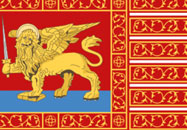Marco Polo (1254-1324)

Death
In 1323, Polo was confined to bed, due to illness. On January 8, 1324, despite physicians' efforts to treat him, Polo was on his deathbed. To write and certify the will, his family requested Giovanni Giustiniani, a priest of San Procolo. His wife, Donata, and his three daughters were appointed by him as co-executrices. The church was entitled by law to a portion of his estate; he approved of this and ordered that a further sum be paid to the convent of San Lorenzo, the place where he wished to be buried. He also set free Peter, a Tartar servant, who may have accompanied him from Asia, and to whom Polo bequeathed 100 lire of Venetian denari.
He divided up the rest of his assets, including several properties, among individuals, religious institutions, and every guild and fraternity to which he belonged. He also wrote-off multiple debts including 300 lire that his sister-in-law owed him, and others for the convent of San Giovanni, San Paolo of the Order of Preachers, and a cleric named Friar Benvenuto. He ordered 220 soldi be paid to Giovanni Giustiniani for his work as a notary and his prayers.
The will was not signed by Polo, but was validated by the then-relevant "signum manus" rule, by which the testator only had to touch the document to make it legally valid. Due to the Venetian law stating that the day ends at sunset, the exact date of Marco Polo's death cannot be determined, but according to some scholars it was between the sunsets of January 8 and 9, 1324. Biblioteca Marciana, which holds the original copy of his testament, dates the testament in January 9, 1323, and gives the date of his death at some time in June 1324.
HISTORY

RESOURCES
This article uses material from the Wikipedia article "Marco Polo (1254-1324)", which is released under the Creative Commons Attribution-Share-Alike License 3.0.
© Stories Preschool. All Rights Reserved.









